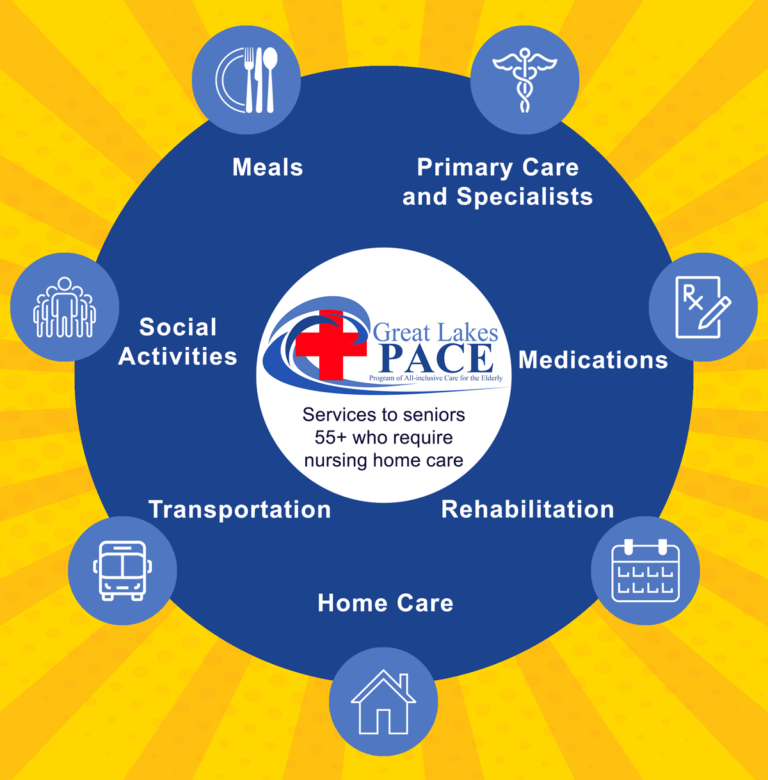
As our loved ones age, their mental health can sometimes take a backseat to physical health concerns. However, mental well-being is just as crucial, especially for seniors striving to maintain their independence. Supporting their mental health not only enhances their quality of life but also helps them stay engaged and active. Let’s explore some practical strategies to promote mental health for aging adults.
1. Encourage Social Connections
One of the biggest factors affecting mental health in aging adults is social isolation. Encourage your loved one to stay connected with friends and family. Regular social interactions can boost mood, reduce feelings of loneliness, and provide emotional support.
You can help facilitate this by organizing family gatherings, scheduling regular phone calls, encouraging them to join community groups, or enrolling them in Great Lakes PACE where they have regular social interactions at our Adult Day Center. Getting involved in social activities can make a world of difference in mental well-being.
2. Promote Physical Activity
Physical activity isn’t just good for the body; it’s also fantastic for the mind! Exercise releases endorphins, which can improve mood and reduce anxiety. Encourage your loved one to engage in regular physical activities they enjoy, whether it’s walking, swimming, or gentle yoga.
Even simple exercises like stretching or dancing around the house can be beneficial. If they need motivation, consider joining them for a daily walk or suggesting an online exercise class designed for seniors. Staying active is key to maintaining both physical and mental health.
3. Stimulate the Mind
Keeping the brain engaged is crucial for mental health, especially as we age. Encourage activities that challenge the mind, such as puzzles, reading, or learning a new skill.
Consider introducing them to games like Sudoku, crossword puzzles, or even video games that require strategic thinking. You might also suggest online courses or workshops that focus on topics they’re interested in. Our Activity Director at Great Lakes PACE incorporates mind-stimulating activities to help with this mental aspect. Keeping the mind active can help stave off cognitive decline and boost self-esteem.
4. Support Healthy Routines
Establishing a daily routine can provide a sense of structure and stability, which is essential for mental health. Help your loved one create a routine that incorporates time for meals, exercise, social activities, and relaxation.
Encourage them to stick to regular sleep patterns, as good sleep is vital for emotional well-being. A consistent routine can create a sense of normalcy and predictability, reducing feelings of anxiety and stress.
5. Facilitate Access to Professional Help
Sometimes, the best way to support mental health is to seek professional help. If your loved one is struggling with feelings of sadness, anxiety, or isolation, encourage them to talk to a mental health professional. Our Social workers at Great Lakes PACE love to sit with participants and help them work through some of the difficult emotions of life. And when it’s beneficial, we’ll work with the whole family unit, too.
You can help them find a therapist or counselor who specializes in working with older adults. Many professionals now offer teletherapy, making it easier for seniors to access mental health services from the comfort of their homes. It’s essential to break the stigma around seeking help—mental health is just as important as physical health!
6. Create a Safe and Comfortable Environment
A safe and comfortable living space can significantly impact mental health. Make sure your loved one’s home is free from hazards that could cause anxiety or fear, such as clutter, poor lighting, or unstable furniture. Need a professional to come to your loved one’s home and do a safety assessment? This service is available for all Great Lakes PACE participants.
Consider making modifications to enhance safety, like adding grab bars or ensuring they have easy access to frequently used items. A cozy, inviting environment can promote relaxation and comfort, allowing your loved one to feel secure in their space.
7. Incorporate Mindfulness Practices
Mindfulness practices can be incredibly beneficial for mental health. Techniques like meditation, deep breathing exercises, or gentle yoga can help reduce stress and promote a sense of calm.
Encourage your loved one to take a few minutes each day to practice mindfulness. There are plenty of resources available online, including guided meditation videos and apps designed to help seniors relax and find peace. Even a short daily practice can make a big difference in their overall mental well-being.
8. Encourage Hobbies and Interests
Engaging in hobbies and interests is a fantastic way to promote mental health. Encourage your loved one to explore activities they enjoy or to try something new. Whether it’s painting, gardening, crafting, or cooking, hobbies can provide a sense of purpose and fulfillment.
If they need inspiration, consider doing some activities together. You could start a gardening project, take a cooking class, or explore art supplies. This not only keeps their mind active but also creates quality bonding time for both of you.
9. Maintain Open Communication
Keeping the lines of communication open is essential. Regularly check in with your loved one about their feelings, thoughts, and experiences. Create a safe space where they feel comfortable sharing their emotions without fear of judgment.
Ask open-ended questions about their day, their interests, and their feelings. This not only helps you stay connected but also shows them that you care. Sometimes, just having someone to talk to can alleviate feelings of loneliness and anxiety.
Conclusion
Promoting mental health for aging adults who want to remain independent is all about fostering connections, stimulating the mind, and supporting their emotional well-being. By implementing these strategies—like encouraging social interactions, promoting physical activity, and facilitating access to professional help—you can help your loved one maintain their independence while ensuring they feel supported and valued.
Remember, mental health is just as important as physical health. With a little effort and compassion, you can help your loved one thrive as they age, enjoying life to the fullest while keeping their independence intact – and that’s the goal of our services at Great Lakes PACE. Together, you can create a fulfilling and enriching environment that promotes both mental and emotional well-being.

